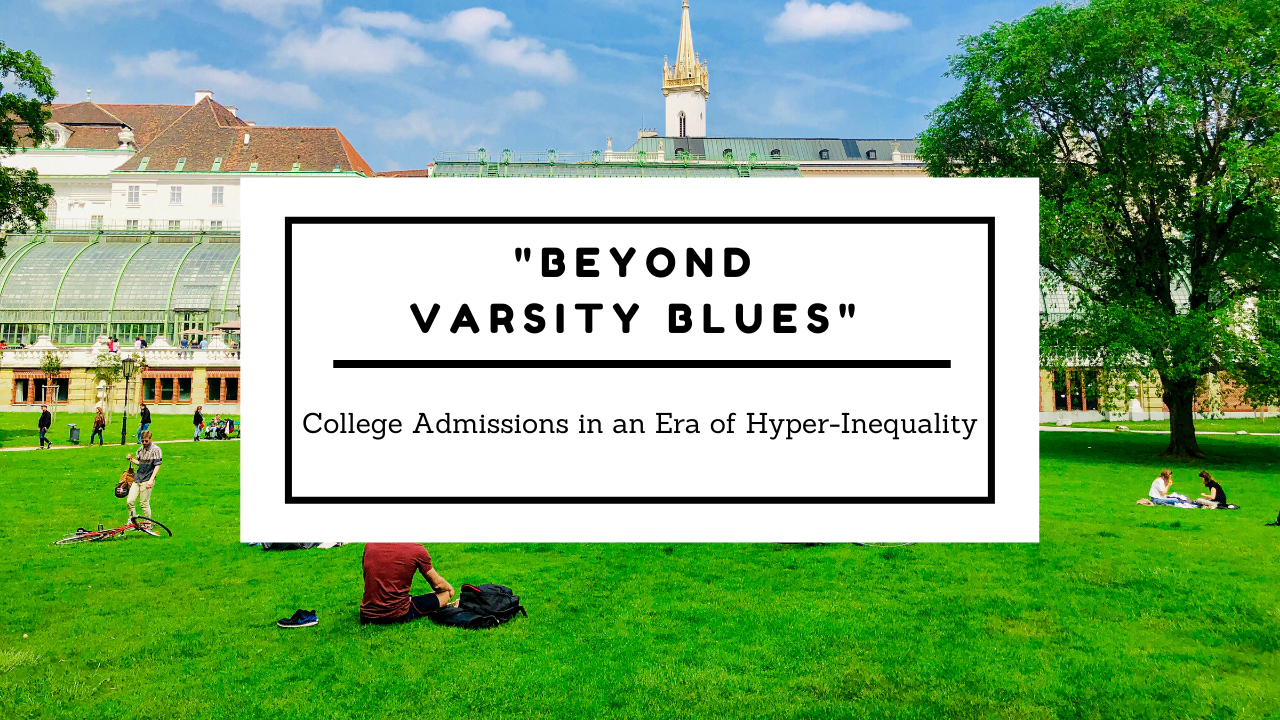 Wealth inequality has undoubtedly created injustices in the college admissions process, but policy solutions to level the playing field often present a tension between state regulation and family autonomy. Although many individuals might agree that certain expenditures related to college admissions—like donations to universities or spending on private college counsellors, for example—should be regulated, the line becomes rather blurry when considering the sorts of expenditures throughout and before high school that can boost a student’s college admissions prospects. Meanwhile, families might perceive state regulation on some of these expenditures as an infringement on an individual’s basic liberty interest in supporting causes important to them.
Wealth inequality has undoubtedly created injustices in the college admissions process, but policy solutions to level the playing field often present a tension between state regulation and family autonomy. Although many individuals might agree that certain expenditures related to college admissions—like donations to universities or spending on private college counsellors, for example—should be regulated, the line becomes rather blurry when considering the sorts of expenditures throughout and before high school that can boost a student’s college admissions prospects. Meanwhile, families might perceive state regulation on some of these expenditures as an infringement on an individual’s basic liberty interest in supporting causes important to them.
This worksheet invites readers to explore their own opinions on which sorts of expenditures are permissible and which ones ought to be regulated, and the following article explores some ways in which family wealth and spending can undermine the equality of opportunity in college admissions.
- "Need Extra Time on Tests? It Helps to Have Cash," Dana Goldstein and Jugal K. Patel. High-income communities have a much higher percentage of standardized testing accommodations than lower-income communities. Goldstein and Patel argue that data like this suggest an unfairness in the process of acquiring accommodations. While some wealthy students may simply be abusing the system, more significantly, they reason that lower-income families don’t have the resources to acquire the up-to-date evaluations needed for their children to qualify.
- “Worries grow about application essay 'help' that may go too far,” Scott Jaschik. Jaschik points out that families with the means are able to hire expensive essay coaches to help workshop students’ college essays to near-perfection. The article raises questions about the ethics of allowing students to submit these workshopped essays that may not truthfully reflect the student’s writing capabilities or ideas.
In addition to paying for services that boost their children’s applications, some particularly wealthy families are able to donate large sums of money to universities, donations that can be hard for admissions committees to ignore when making their decisions. Although legal, these donations raise significant ethical questions about the fairness of the college admissions process. For some, there’s little difference between donations like these and briberies. The following articles consider the morality of donations.
- “Turns Out There’s a Proper Way to Buy Your Kid a College Slot” The New York Times’ Editorial Board suggests that wealthy families can essentially “buy” their children’s way into elite colleges through generous donations to a university, calling into question whether a true meritocracy in the U.S. would be impossible even if everyone abided by the law.
- “In Admissions, Harvard Favors Those Who Fund It, Internal Emails Show,” Delano R. Franklin and Samuel W. Zwickel. In 2014, Harvard University was sued by Students for Fair Admissions, an anti-affirmative action group accusing Harvard of engaging in racially discriminatory admissions practices. In 2018, as the case continued to drag through the courts, emails emerged detailing some of the ways that Harvard’s admissions practices favor children of big money donors. Among other findings, the emails reveal a former Dean of the Kennedy School of Government thanking Dean of Admission William Fitzsimmons for accepting the children of three individuals, one of whom had “committed to a building.”
- “Felicity Huffman Is Guilty, but So Are University Shakedown Artists,” Frederick M. Hess and Hannah Warren. Hess and Warren argue Felicity Huffman is clearly guilty for her role in the ‘Varsity Blues’ scandal. However, they are critical of the fact that she was prosecuted for her crimes, while admissions officials who admit students whose parents have donated to schools have suffered no consequences. For these authors, giving big-dollar donations and committing bribery of the sort Huffman and other parents were charged with are ethically comparable practices.
Questions for Discussion:
-
In your experience, what sorts of family expenditures are most common in the college admissions process? Which of these expenditures do you think are acceptable? What sorts of expenditures cross the line?
-
Is there a way to restrict the sorts of family expenditures discussed in the articles above? How?
-
Is there a difference between donations and bribery? If so, what is that difference?
-
Should private donations to colleges and universities be more strictly regulated? How?
-
Should we assume that we cannot control or restrict how families spend their money and instead hold admissions teams responsible for maintaining the equality of opportunity in the admissions process by expanding programs like affirmative action?
-
Or given this assumption, should we eliminate selective admissions altogether in favor of students attending their local universities? Or, perhaps, in favor of an outright lottery?
-
Should we reform admissions to resemble the British system, which ignores everything other than academic performance?
